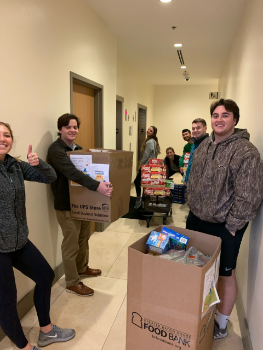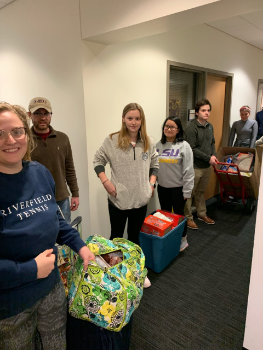Marketing to Give
LSU marketing students tackle food insecurity in Baton Rouge through service-learning.
BATON ROUGE—Marketing is a valuable tool when selling goods and/or services; however, it can also have a negative reputation when people are encouraged to over-consume. An LSU marketing professor is addressing this tension her courses. Dr. Courtney Szocs developed a service-learning course that teaches students how to utilize marketing principles effectively to convince consumers to give instead of buy.

Marketing students stand with donated food.
In Fall 2019, Dr. Szocs partnered with the Greater Baton Rouge Food Bank in her Marketing
3411: Customer Analysis and Behavior course, which aims to explain how to create a
target customer profile and develop a marketing campaign around it. Szocs led her
two sections of students in crafting campaigns to address local food insecurity, a
critical community hardship, with the goal of enticing people to donate nonperishable
foods and other supplies.
For her students to execute their campaigns successfully, Szocs begins the class with the text “Weapons of Influence'' by Robert Cialdini. The course’s first test takes place before the service-learning project begins, ensuring that the class is familiar with the principles they will use before formulating any communications efforts for their community partner.
“There’s a lot of background work on the front end of designing a campaign [that must be done] to predict and understand the psychology driving donation behavior,” Szocs explained.
That background work included research into the state’s higher-than-average levels of food insecurity. According to Louisiana Budget Project, over 15% of households in Louisiana experience this challenge, which disproportionately affects many already vulnerable groups like the state’s elderly population.
As students discover these facts and acquire the “weapons” at their disposal, they are divided into groups of five to six and began designing their campaigns with Szocs guiding them and providing feedback along the way.

Students prepare the food donations for pick-up.
The deadlines for students’ campaigns coincided with the Thanksgiving holiday—a time where food banks work hard to provide holiday meals to people in need. The Greater Baton Rouge Food Bank serves 11 parishes and operates a Mobile Pantry program that delivers to hard-to-serve areas so the holidays have no shortage of work to be done.
Across the two sections’ service campaigns, Szocs and her students collected 8,429 pounds of food, which represents over 7000 meals for people in the Greater Baton Rouge area. Szocs herself was surprised by the total and said that though she had “high expectations from teaching this class before,” they were exceeded by the Fall 2019 outcome.
Through the lens of service to others, marketing continues to be a resourceful tool. From identifying and responding to a need in the community to growing a partnership with the Greater Baton Rouge Food Bank, Professor Szocs’ motivation to serve through her work calls her students to do the same.
“I do this because I want them to get something out of the experience and hopefully see that […] we can use [marketing] for something good,” Szocs emphasized.